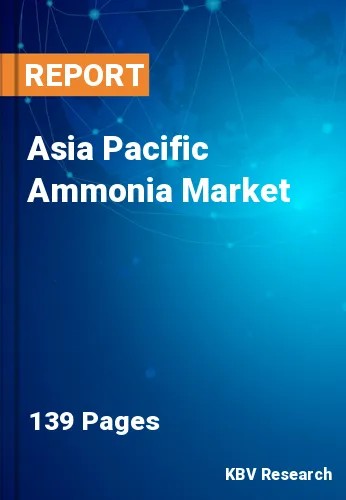The Asia Pacific Ammonia Market would witness market growth of 5.4% CAGR during the forecast period (2023-2030). In the year 2021, the Asia Pacific market's volume surged to 1,01,631.7 Kilo Tonnes, showcasing a growth of 5.1% (2019-2022).
Ammonia is primarily produced through the Haber-Bosch procedure, which implicates the reaction of nitrogen and hydrogen gases under high pressure and temperature. The largest ammonia producer is typically China. Ammonia is a vital component of nitrogen-based fertilizers like urea and ammonium nitrate, which enhance crop growth and improve agricultural yields. It is used as a feedstock in producing various chemicals, including ammonium sulfate, nitric acid, and various plastics and resins. It is a popular refrigerant in industrial systems due to its excellent cooling properties and low environmental impact.
The market is closely tied to the global demand for fertilizers. Agricultural practices, weather conditions, and government policies can influence fertilizer demand and ammonia prices. Environmental concerns have led to increased scrutiny of ammonia production and emissions. Some regions have imposed stricter regulations on ammonia emissions, leading to changes in production processes and increased costs. There is growing interest in producing "green ammonia" using renewable energy sources and sustainable methods to reduce the carbon footprint of ammonia production. Ammonia prices can be volatile, influenced by natural gas prices (a key feedstock for ammonia production), supply-demand dynamics, weather-related agricultural disruptions, and geopolitical factors.
According to the Economic Development Board (EDB) Singapore, eight of the top ten pharmaceutical companies have facilities in Singapore, manufacturing 4 of the top 10 drugs by global revenue. Companies like GlaxoSmithKline, MSD, and Roche are based on various commercial activities in Singapore. S$4 billion in public sector analysis funding has been committed to the Health and Biomedical Sciences domain. The growth of the pharmaceutical industry in Singapore, combined with advancements in technology, research, and quality control, can drive the demand for ammonia and related products in various applications within the industry. Pharmaceutical manufacturers and research institutions may continue to seek innovative ways to utilize ammonia safely and efficiently in their processes. These elements boost the expansion of the market in this region.
The China market dominated the Asia Pacific Ammonia Market, By Country in 2022, and would continue to be a dominant market till 2030; thereby, achieving a market value of $51,889.5 million by 2030. The India market is registering a CAGR of 5.8% during (2023 - 2030). Additionally, The Thailand market would showcase a CAGR of 4.9% during (2023 - 2030).
Based on Product Form, the market is segmented into Anhydrous, and Aqueous. Based on Application, the market is segmented into Fertilizers, Refrigerants, Pharmaceuticals, Textile, and Others. Based on countries, the market is segmented into China, India, Thailand, Japan, South Korea, Australia, and Rest of Asia Pacific.
Free Valuable Insights: The Global Ammonia Market is Predict to reach $306.7 Billion by 2030, at a CAGR of 5.6%
The market research report covers the analysis of key stake holders of the market. Key companies profiled in the report include SABIC (Saudi Arabian Oil Company), Linde PLC, Yara International ASA, Nutrien Limited, BASF SE, Sumitomo Chemical Co., Ltd., Koch Industries, Inc. (Molex LLC), CF Industries Holdings, Inc., Qatar Fertiliser Company (Industries Qatar), and PJSC Togliattiazot.
By Product Form (Volume, Kilo Tonnes, USD Million, 2019-2030)
By Application (Volume, Kilo Tonnes, USD Million, 2019-2030)
By Country (Volume, Kilo Tonnes, USD Million, 2019-2030)
Our team of dedicated experts can provide you with attractive expansion opportunities for your business.

